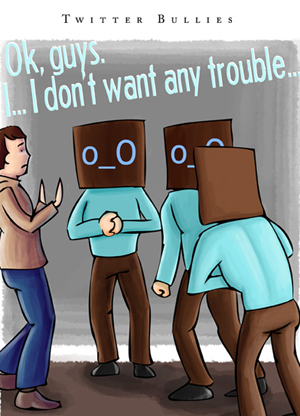1 New Notification: Cyber Bullies and Social Networking
 It is a rare individual that did not experience any bullying during their time at school but in recent years, the internet has offered another branch to the bullying tree. The exploits of bullies are no longer confined to the six hours spent in primary or secondary educational establishments, thanks to message boards, social media platforms and the like.
It is a rare individual that did not experience any bullying during their time at school but in recent years, the internet has offered another branch to the bullying tree. The exploits of bullies are no longer confined to the six hours spent in primary or secondary educational establishments, thanks to message boards, social media platforms and the like.
One recent and prominent example of online bullying (dubbed “cyber bullying”, a term that also refers to text message bullying) is the case of Mississippi student Constance McMillan who was banned from her high school prom when she announced that she wanted to bring her girlfriend along to the event. The press went crazy for the story and as a result, students from McMillan’s school posted detrimental comments to a Facebook group entitled “Constance, quit yer cryin.”
The news announced last week that a new scheme had just been launched in Reading (UK) in order to try and tackle the issue of cyber bullying in the area. The Thames Valley Police is linking up with volunteers who are being bullied online in order to identify and track those causing distress to peers via the social network of Facebook. Any Facebook bullies that the scheme uncovers will be sent a message from the police warning them of the consequences they will face should they continue to bully people on the WWW. The parents of these cyber bullies will also be contacted.
I am not convinced that such a scheme will stamp out bullying. A teenager may continue to bully an individual offline once they have been caught doing so on the web, though you would hope the involvement of the authorities would be enough to detract them from doing so.
It should be clear to most people that undertaking bullying online is the worst idea. The evidence is often available for all to see and as such, there is little chance for cyber-bullies to deny their actions. It is the choice of some bullies however because it is easier to get support from peers for derogative remarks online than it is in real life where people (generally) are more reluctant – or scared – of confrontation. The internet is a space that allows – and even encourages – free speech so it is too easy for individuals to forget that their comments may be being monitored.
An example of this is when I was studying at university. My course mates and I had a lecturer who wasn’t particularly gifted at teaching and so, one student made a Facebook group which announced this. Queue a tirade of fellow students commenting on the wall in a way that attacked her in a personal way and many MS Paint defaced pictures of the lecturer too. When the university discovered the group, the creator was forced to leave the university indefinitely and anyone who had commented on the wall was asked to make a formal apology.
Bullying is very upsetting for the victims involved. If you know someone who is being bullied online, it is important to contact staff at their school and keep a record of all online attacks and comments made in case any further action is required.
Kat Cole spends her days designing packaging for a wide range of items including chairs, pens, cutlery and dehumidifiers but enjoys live music performances and writing guest blog posts in her spare time.


Hi Cole,
I think cyber bullies is very annoying, and what they have done damage good name of person or instance. I agree with you to report them.
I have read many story about people who become cyber bullies and they expelled from their school.
I am fully against any form of cyber bullying, recently read an article about a youth in UK that was hounded by cyber bullies by being told that her online BF had committed suicide because of her.
I could rape your soul and destroy your life and you can do nothing to prevent it or punish me. Being natural born victims, you just dont understand the fun… As long as the Internet by default is an anonymous space and the bullying is lulzworthy, the lulztrain will keep rolling